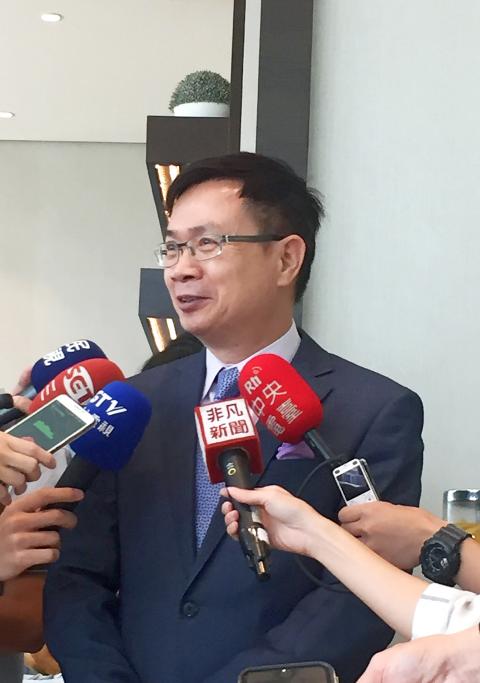Philippine nationals could become eligible for visa-free entry for stays in Taiwan of up to 14 days by next month or November, Ministry of Foreign Affairs Department of East Asian and Pacific Affairs Director-General Winston Chen (陳文儀) said yesterday.
The details of the new policy were hammered out at an interministerial meeting of national security, police, immigration and other officials, Chen said at a news conference, adding that Premier William Lai (賴清德) approved the program on Wednesday.
The government has decided to implement the visa-free program on a trial basis to promote people-to-people, tourist and commercial exchanges between Taiwan and the Philippines, Chen said, adding that the start date for the trial is expected to be announced in a month.

Photo: CNA
The government encourages Manila to follow the principle of reciprocity and grant Taiwanese nationals visa-free privileges as soon as possible, Chen said.
The government has since Aug. 1 relaxed visa rules for nationals of the 10 ASEAN member states, which include the Philippines, as well as for Indian nationals.
Taiwan included the Philippines in its electronic visa program on Oct. 7 last year.
The Travel Agent Association of the Republic of China, Taiwan said it expected the visa-waiver program to attract 33 percent more Philippine visitors to Taiwan next year and boost tourism revenue by NT$2 billion (US$65.8 million).
Tourism revenue from Philippine tourists has been forecast to reach NT$7 billion this year, it said.
The Manila Economic and Cultural Office in Taipei (MECO) later yesterday said that it welcomes the ministry’s plan for the visa waiver program, adding that it would respond to the friendly gesture by relaxing visa requirements for Taiwanese travelers in the Philippines.
In a separate statement, it called for Taipei and Manila to work more closely together, especially on fighting cross-border crime.
That statement came a day after the Taipei Economic and Cultural Office (TECO) in Manila rejected a claim by Philippine President Rodrigo Duterte that drugs in the Philippines originated in Taiwan.
MECO Chairman Angelito Banayo called for closer cooperation in the areas of law enforcement and combating organized crime.
“We all know that organized crime, specifically drug trafficking, knows no borders, which calls for closer coordination between the Philippine and Taiwan authorities,” Banayo said.
MECO and TECO have been working together “closely in forging agreements on law enforcement cooperation aimed at addressing borderless crimes such as drug smuggling and human trafficking,” the statement said.
Such law enforcement agreements are in the pipeline and are expected to be signed by the end of this year or early next year, the statement added.
One of the key components of President Tsai Ing-wen’s (蔡英文) New Southbound Policy is to strengthen collaboration with other nations to fight international crime, which in the case of the Philippines means a concerted effort to combat narcotics, the statement said.

AIR SUPPORT: The Ministry of National Defense thanked the US for the delivery, adding that it was an indicator of the White House’s commitment to the Taiwan Relations Act Deputy Minister of National Defense Po Horng-huei (柏鴻輝) and Representative to the US Alexander Yui on Friday attended a delivery ceremony for the first of Taiwan’s long-awaited 66 F-16C/D Block 70 jets at a Lockheed Martin Corp factory in Greenville, South Carolina. “We are so proud to be the global home of the F-16 and to support Taiwan’s air defense capabilities,” US Representative William Timmons wrote on X, alongside a photograph of Taiwanese and US officials at the event. The F-16C/D Block 70 jets Taiwan ordered have the same capabilities as aircraft that had been upgraded to F-16Vs. The batch of Lockheed Martin

GRIDLOCK: The National Fire Agency’s Special Search and Rescue team is on standby to travel to the countries to help out with the rescue effort A powerful earthquake rocked Myanmar and neighboring Thailand yesterday, killing at least three people in Bangkok and burying dozens when a high-rise building under construction collapsed. Footage shared on social media from Myanmar’s second-largest city showed widespread destruction, raising fears that many were trapped under the rubble or killed. The magnitude 7.7 earthquake, with an epicenter near Mandalay in Myanmar, struck at midday and was followed by a strong magnitude 6.4 aftershock. The extent of death, injury and destruction — especially in Myanmar, which is embroiled in a civil war and where information is tightly controlled at the best of times —

China's military today said it began joint army, navy and rocket force exercises around Taiwan to "serve as a stern warning and powerful deterrent against Taiwanese independence," calling President William Lai (賴清德) a "parasite." The exercises come after Lai called Beijing a "foreign hostile force" last month. More than 10 Chinese military ships approached close to Taiwan's 24 nautical mile (44.4km) contiguous zone this morning and Taiwan sent its own warships to respond, two senior Taiwanese officials said. Taiwan has not yet detected any live fire by the Chinese military so far, one of the officials said. The drills took place after US Secretary

US President Donald Trump yesterday announced sweeping "reciprocal tariffs" on US trading partners, including a 32 percent tax on goods from Taiwan that is set to take effect on Wednesday. At a Rose Garden event, Trump declared a 10 percent baseline tax on imports from all countries, with the White House saying it would take effect on Saturday. Countries with larger trade surpluses with the US would face higher duties beginning on Wednesday, including Taiwan (32 percent), China (34 percent), Japan (24 percent), South Korea (25 percent), Vietnam (46 percent) and Thailand (36 percent). Canada and Mexico, the two largest US trading